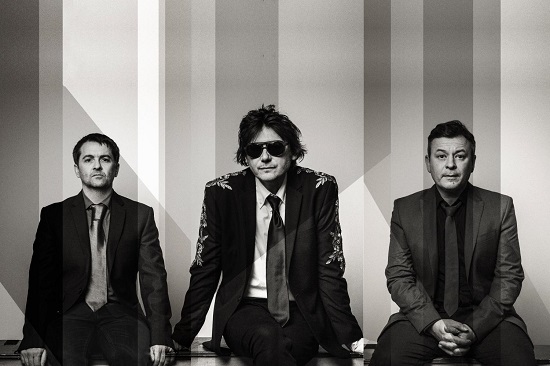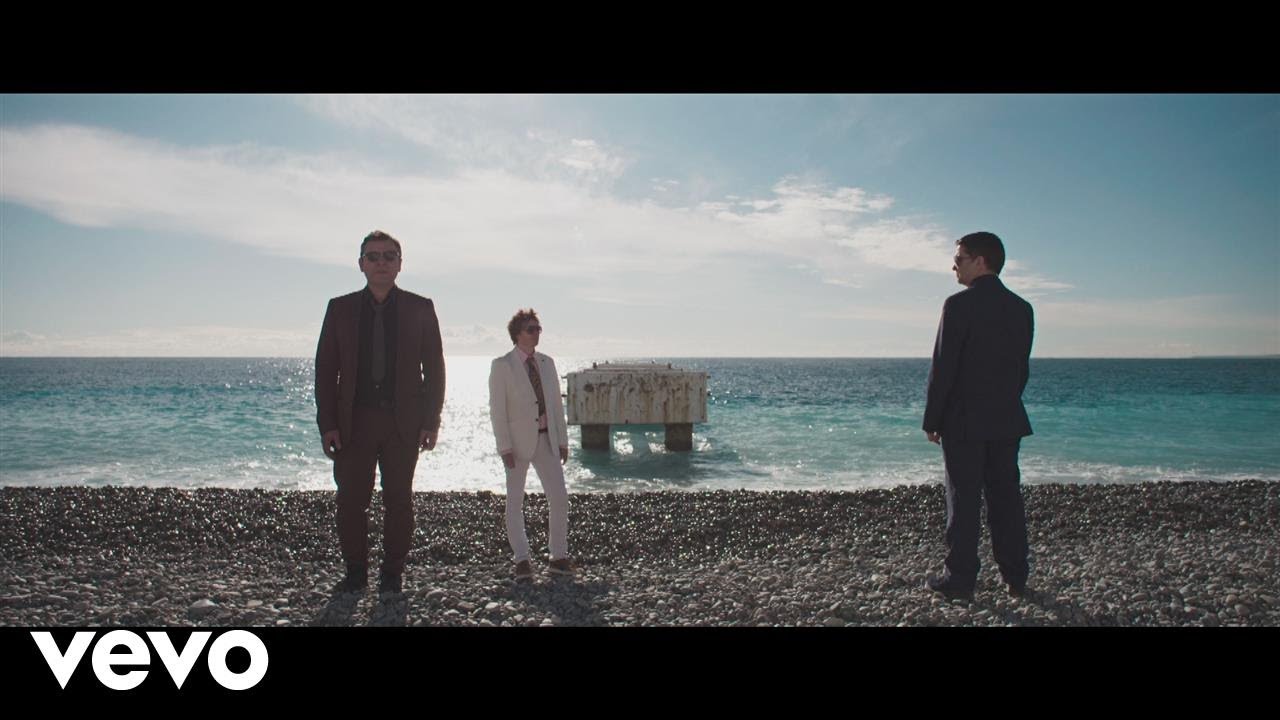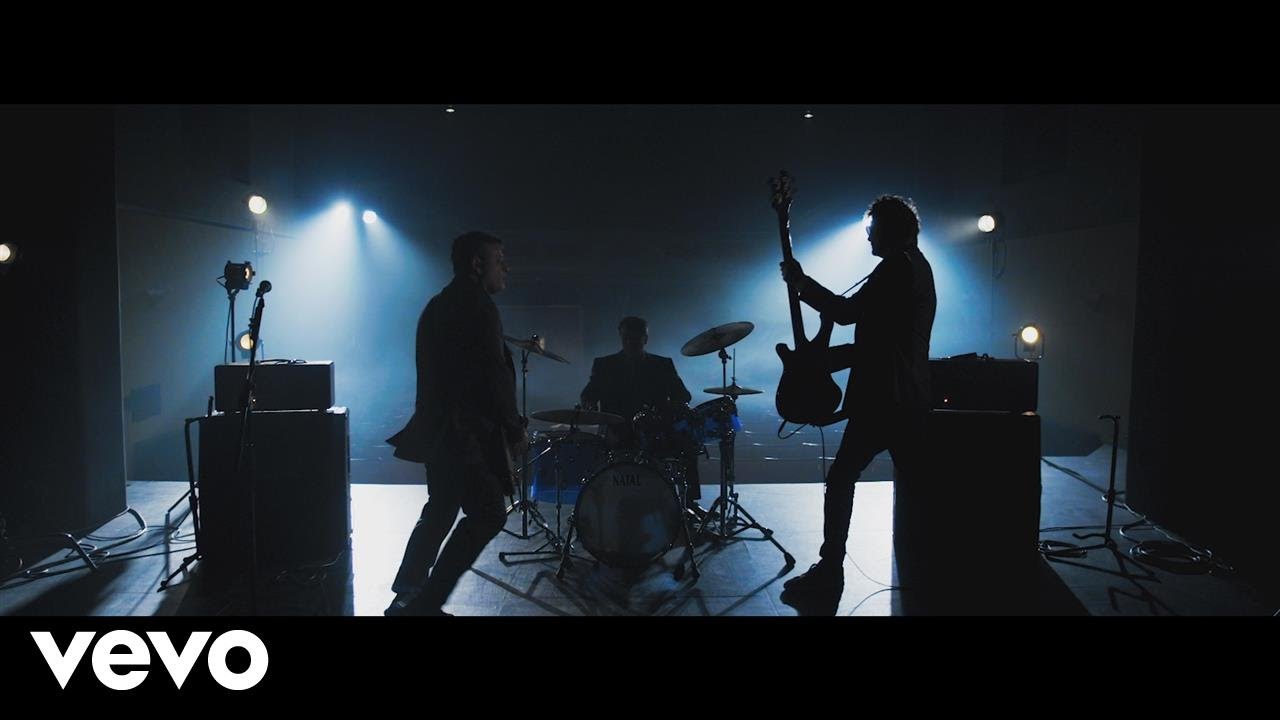For good or ill, the Manic Street Preachers have always had a streak of doing entirely the opposite of what common sense might dictate. Take Generation Terrorists, for example, where a wickedly sharp and breathless sloganeering punk group mutated into a hulking arena-glam behemoth for their debut record, or their mid-90s resurgence to become Britain’s biggest rock band just as they’d released their most opaque piece of commercially suicidal brilliance The Holy Bible and their genius creative essence Richey Edwards had vanished without trace.
The list goes on: the sprawling stylistic mish-mash of Know Your Enemy as the follow-up to their commercial peak This Is My Truth Tell Me Yours, the out-of-nowhere pop sensation that was ‘Your Love Alone Is Not Enough’ appearing just as they’d seemingly lost all relevance, and actually making the trans-European industrial-pop monolith they’d promised so many times we thought it would never appear, Futurology.
So too is their forthcoming thirteenth record Resistance Is Futile a decidedly confounding turn. In a time of what feels like unprecedented upheaval, fury and depression – all the qualities the Manics have drawn upon with phenomenal power in their finest moments – they have abandoned them all for what seems like their most celebratory and optimistic album to date.
tQ meets Nicky Wire in his hotel room in Marylebone’s impossibly lavish Landmark Hotel. Sky Sports is muted in the background and he’s in sunglasses, a Clash t-shirt and a deep red blazer bearing a blue badge on which the words ‘INTERNATIONAL BLUE’ are written in stark capital letters. That’s the title of the bombastic lead single from the record, about the nouveau réalisme artist Yves Klein’s celebrated colour of the same name. Resistance Is Futile essentially boils down to a series of gushing vignettes about things the band love – the photographer Vivian Maier, the poets Dylan and Caitlin Thomas, the beauty and defiance of the city of Liverpool. It is an album that finds rays of cultural light in an era where darkness encroaches on all sides.
I have always looked at the Manics’ career in eras. There is the Richey-led run from Generation Terrorists through to The Holy Bible and the subsequent shift towards sprawling commercial domination that fizzled out with the much-maligned MOR synth outing Lifeblood. Then there was the rush of newfound vibrancy and creativity that came with Send Away The Tigers which kickstarted a new era that has run without much fault through to their career-highlight last record Futurology. It has now been four years since that album was released, the longest ever between Manics records. So does this album feel, I ask Wire, like the start of something new?
“It either feels like a new era or the end,” he says with just a hint in his voice he might mean it this time. “In terms of relevance, in terms of us still selling records, it is an issue for us. It’s not so enjoyable unless you still feel some kind of vitality and importance. We’re not one of those bands that says ‘Well if we like it then that’s enough,’ we’ve never been like that. We still want people to like it.” It’s a streak that’s always been there with The Manics, and as the threesome have marched onwards across a career of what’s now been 30 years it remains remarkable how even after their fair share of lulls they’ve still been able to repeatedly snatch new vitality from the jaws of fading relevance.
It has always been so, Wire affirms. “Generation Terrorists is just a desire for world domination with some pretty awkward lyrics, but it was all about relevance. I think at that point what made us different was a desire for popularity in an elitist, indie world. Even with The Holy Bible, which is the biggest fuck you of all, we still actually thought, Perhaps ‘She Is Suffering’ could be a big hit! It sounds like ‘Every Breath You Take’! We still thought along those lines. The only time we’ve ever reacted against ourselves in terms of popularity was Know Your Enemy, that was a wilfully destructive album.”
The long wait for Resistance Is Futile was down to a number of factors. First there was the bulldozing of the band’s Faster Studios in Cardiff, where they’d worked since 2001, to make way for luxury flats – “the neverending urban crawl!” as Wire proclaims it – and the construction of the band’s new space on the outskirts of Newport, overlooking the imposing bridge that crosses the river Usk. Then there was the matter of the band getting to grips with their history, the two enormous tours marking the anniversaries of The Holy Bible and Everything Must Go, encompassing triumphant homecoming shows at Cardiff Castle and Swansea’s Liberty Stadium respectively.
But beyond the practicalities and the housekeeping, there were more serious impediments to the Manics’ creative process. Last October, the BBC reported that the band might be ending for good. They quoted Wire: “It’s really frightening actually because I just don’t know [if we’ll have another record]. It’s hard to see one coming out at the moment.”
The band were burnt out by all accounts after the mountainous creative pinnacle of Futurology, left with a ‘desire to rock again’ but uninspired as to a focus upon which to channel it. “I’d put so much research into Futurology, going deep into stuff like the Die Brucke art movement in Berlin,” Wire tells me, “and I wrote a lot of the music too, the title track, ‘Divine Youth’ and ‘Mayakovsky’ are all my songs. It’s probably why it took a long time to start again.”
But just as ‘A Design For Life’ reinvigorated the band with the spirit to keep going after Richey Edwards’ disappearance, so too did ‘International Blue’ two decades later. “It’s been a strange record to make, we had lots of stuff flying around, lots of stuff half-finished. We’d done a session of [album tracks] ‘Dylan and Caitlin’ and ‘The Left Behind’ a while ago but there was no real focus until ‘International Blue’, that was the thing that brought it all together. There was a joy to ‘International Blue’ that we weren’t sure we could convey any more, the feeling of being in love with something like Yves Klein, to pass on the joy of that colour and that vividness – we weren’t sure if we still had it in us. It sounds quite young. When James first came to me with ‘International Blue’ it sounded like ‘Boys Of Summer’, then he totally changed it and it sounded like a first single. It’s got just a hint of Generation Terrorists about it because it’s quite cosmetic – it’s a classic Manics radio song.”
The other standout on Resistance Is Futile is ‘Liverpool Revisited’, the shortest song on the album but by far the most striking – a bombastic uber-romantic sweep of brilliant guitar with James Dean Bradfield’s voice thrown forth with everything he’s got. Here, more than anywhere else, you can feel the band’s desire to pass on the moments in which they find rays of hope. “‘Liverpool Revisited’ is about what was just a magical day,” says Wire. “It was on the Everything Must Go [anniversary] tour and I got up really early at sunrise to walk around Liverpool, polaroid camera in hand on a balmy day. It sounds clichéd I know, but Liverpool in the sun does take on a hypnotic quality, with the Mersey and the stone. I wrote it after I’d had an afternoon nap on a beautiful day, and in some respects it’s the sister song to [The Manics’ ferocious 1998 song about the Hillsborough disaster] ‘South Yorkshire Mass Murderer’, about how one city took on the entire establishment of Britain. It’s something so amazing, and perhaps only the citizens of Liverpool could have done it. To fight hard and take on every fucker, it’s such a symbol of old school working class solidarity of the most exceptional kind. The weight that was against them! For them to fight that hard… I couldn’t have done it, it’s such an inspiration. And that gig was just a magical gig. The closing lyrics – ‘as the night falls around me I see joy and devotion’ – that’s what it felt like that night.”
There are other such vignettes on the album, among which the duet ‘Dylan And Caitlin’ also stands out as one of the few times Wire’s taken on a character-based piece, writing outside of himself. “James wanted to have something on the album like ‘Don’t Go Breaking My Heart’ by Elton John and Kiki Dee, and I wanted to write something a bit character-based, which isn’t really me. The extreme love and extreme hate that can take part in a relationship from both sides. You know us as a band, we’ve always felt a duty to pass on things that we think are more interesting than we are. From ‘Kevin Carter’ to ‘Let Robeson Sing’, it’s a part of who we are. ‘Interiors’ was about Willem de Kooning, Richey had endless reference points. We’ve always had that desire to pass on. We’re always seen as quite a negative, po-faced band, but we’re not. It’s just been about passing on our love of our inspiration.”
Indeed, everything the Manics have ever put out, even the setlists they use on stage, has come bearing a quote somewhere or another, but never have they taken it to quite this extreme. The band are revelling in the joy of art to a point that it consumes the entire record, and as a result is wilfully disengaged from the outside world to a point that it’s a little unusual. In the four years since Futurology the political world has been thrown into such tumultuous confusion that many might expect a band like the Manics to at least have something to say in response.
“I can’t direct my anger at a single thing, politics is so overlapping and everything is so complicated that I think it’s really trite to direct it at specific targets,” Wire offers in defence. “That’s the malaise we find ourselves in. It’s the classic case of Tony Benn being the ultimate icon of socialism, and he never wanted to be in the European Union! Everyone keeps using him as a totem on the left, but are desperate to stay in the EU. People don’t know their history, they toss things out there. There’s this obliteration of fact; I know what I stood for, but I’m not quite sure what I stand for. I believe in all those tenets from the past, they’re still deep within us, but I don’t know if that relates to certain aspects of modern life, and what people think. The reason why Tony Benn didn’t want to be part of the EU is because you can’t do nationalisation within the EU, it’s against their rules! But then again, I voted remain because I wanted to be part of Europe, but also I want to nationalise everything! That dichotomy is very difficult to navigate. I’m a man without a fucking political creed at the moment. I can’t apply myself as I wish I could. I don’t know if that’s age or just general fatigue, but I am so all over the place.”
This is not the first time Wire’s referred to himself in these terms. Last year he told NME, “I feel like a man without a party at the moment.” It’s worth noting, I suggest, that many young people felt like they were without a party too until Jeremy Corbyn came along. “But those young people are desperate to stay within Europe, and he doesn’t want to! He’s an old school communist! That’s what I’m trying to say – how do you marry up all these interconnected things? It’s so complicated for young people, every aspect of their lives. I am so glad I grew up in semi-simple poverty. It was never poverty of the mind. I have no complaints at all about not having consumerist desires. Life was brilliant, my childhood was fucking amazing and I’m so grateful that I had it, so grateful that there was such a focus. That’s so disparate now.”
However celebratory, then, the new record is not an ‘optimistic’ album; every moment of celebration is shaped by a sense of loss. Resistance Is Futile is not, he argues, an escapist piece, but a melancholia-tinged love-letter to the kind of brilliant art whose powers he finds are fading. “It’s not a nostalgic album at all, but it does reference things that are just gone forever, and whatever anyone says they’re not coming back,” he asserts. “There will never be anyone as good as David Bowie, ever! There’s never going to be a working-class kid who turns into the most sexy, intellectual, career-shifting artist of all time. Certain parts of our culture are just gone forever. On the track ‘Vivian’, which is about Vivian Maier, there’s this idea that 20,000 negatives were stored somewhere and never seen. That idea of a gigantic mistake or some obscurity, that can’t exist in a digital world because everyone’s fucking seen it on their Facebook. Everyone knows there’s a radical shift, but I don’t think we quite realise that whether it’s Mark E Smith or whatever, it’s gone and it ain’t coming back. It comes from the complete bewilderment of where we find ourselves as a band, and therefore art is a bit of a hiding place.”
He sighs, and removes his sunglasses to reveal tired-looking eyes. “It’s not the politics that frightens me, it’s the control of giant tech companies, you can go back to ‘Billion Balconies’ on the Postcards album, those are the things. Politicians and political situations will always change, that is why we have democracy, for good or bad, but those fuckers in their ring-fenced compounds in California, there’s nothing we can do about them.”
In many ways the Manics’ true optimistic record was in fact Futurology, an unabashed celebration of continental-wide artistic brilliance undercut with a feeling of powerful and ceaseless motion. Would that record have been the same, I wonder, if they’d been making it post-Brexit? “I think the joy of Futurology was the idea of connecting the dots on those amazing drives and tours we did which would start in Oslo then divert through the whole of Europe, and making the connections through art in particular. It wasn’t a political ideal on Futurology, it was much more artistic, those ideas that overlap with each other. I think those glory days which culminated in many ways with Kraftwerk, that period of 50 or 60 years, I’m not sure if that exists anymore. It’s one thing for it to be easy to travel through Europe, but it’s another to say there’s an artistic ideal which combines us.”
The new Manics album, however celebratory, is shrouded in loss and anxiety, but they continue to push forwards as ever against the grain. They embark on an arena tour to support it this April, as good a barometer as any as to whether they still garner the relevance they’ve always craved, while later this year there’s another moment of historical housekeeping to be considered as This Is My Truth Tell Me Yours turns 20. The last of the truly enormous Manics albums, and with the precedent now set to remember these landmarks as they have with The Holy Bible and Everything Must Go, will their successor be similarly celebrated? “It’s the stuff I’ve got most of in an archival sense, demos and unheard stuff, fragments of different songs, so there will definitely be some kind of box set but I don’t know if we’re gonna tour it yet. It will be the most comprehensive ‘unheard’ kind of boxset we’ve done though, there’s versions of ‘Tsunami’ that are infinitely better than the final one, really fast and pretty punk and driving. For some reason we got confused and slowed it down, it’s got the crunch, a real quality. I started videoing and taking loads of polaroids at this point as well, so visually there’s loads of stuff.”
It remains to be seen whether this will be the only form in which we see the Manic Street Preachers once the Resistance Is Futile release cycle winds down, whether this is the last creative drive for the Manics before they retreat into clearing out the old vaults and little more, whether this is, as Wire put it, the end of it all or the start of something new. But in the destruction of Faster Studios can be found, perhaps perversely, the signs of new green shoots.
“We needed de-cluttering,” says Wire. “And from this new studio we’ve built, you look directly at Newport Transporter Bridge which is an amazing view. You feel like you’re outside of everything. Faster was in the middle of Cardiff, that was it. There’s more of a widescreen element to where we are now. It’s a brilliant place to work and James is just constantly itching to do stuff. With James and Sean it’s much more about either the now or the next. There’s something with me about being obsessed with history and it can drag you down a little bit. I get too petty and too pernickety about opinion and about politics. Sometimes you’ve just got to plough forward.”





